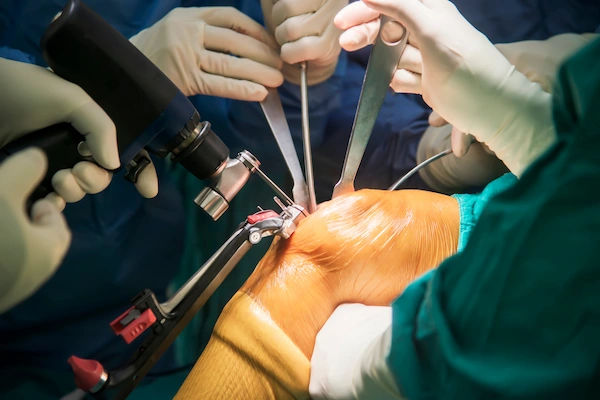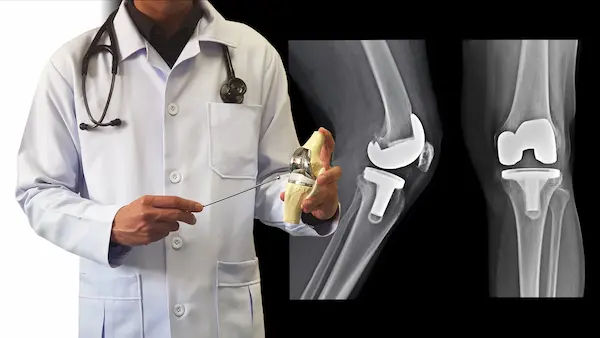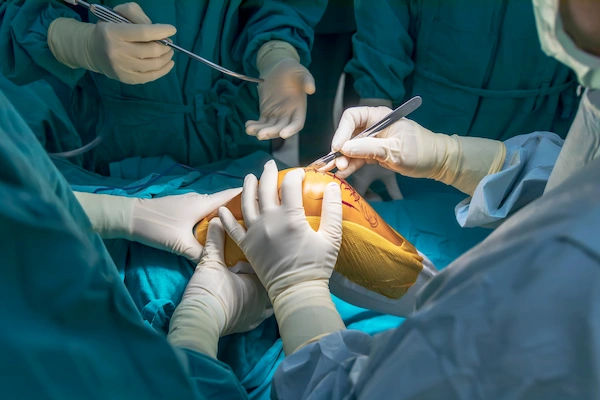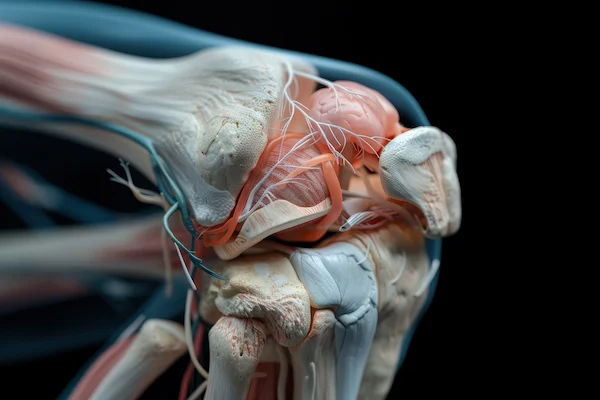Guide to Myths And Facts Of Knee Replacement
Know about the knee replacement myths, facts explained in detail, journey from surgery to recovery and more.


Introduction
Chronic knee pain can feel like a life sentence, limiting your ability to enjoy simple pleasures like a walk in the park or playing with your grandchildren. When conservative treatments no longer work, knee replacement surgery often emerges as a beacon of hope. However, the decision is frequently clouded by misinformation and fear. Stories from well-meaning friends or outdated information online can create a barrier between you and a pain-free life.
This guide is designed to cut through the noise. We will separate the common myths from the evidence-based facts about knee replacement. Whether you're just starting to consider your options or are scheduled for surgery, understanding the reality of the procedure, the recovery process, and the long-term outcomes is crucial. Our goal is to empower you with accurate knowledge, so you can have an informed and confident discussion with your orthopaedic
specialist about the best path forward for your joint health.
Debunking Common Knee Replacement Myths
Many hesitations about surgery stem from persistent myths. Let's address the most common ones head-on.
Consult a Top Surgeon for Personalised Advice
Myth 1: "I'm Too Young (or Too Old) for a Knee Replacement"
This is one of the most pervasive myths. The idea that there's a "perfect age" for surgery is outdated. In the past, surgeons were hesitant to perform replacements on younger patients due to concerns about implant longevity. Conversely, some feared older patients wouldn't tolerate the procedure well.
The Reality: The decision for surgery is not based on a number in your ID card. It is based on your level of pain, disability, and overall health. A 50-year-old with severe osteoarthritis who can no longer work or exercise is a better candidate than an unhealthy 80-year-old. Modern implants are more durable, often lasting 20 years or more, making them a viable option for younger, active individuals. The key is a thorough evaluation by an orthopaedic surgeon to assess your specific situation. If your pain is significantly impacting your quality of life, it's worth discussing the signs you need a knee replacement with a professional, regardless of your age.
Myth 2: "The Recovery is Too Painful and Long"
The fear of excruciating post-surgical pain is a major deterrent. Images of being in agony for weeks understandably cause anxiety.
The Reality: While some discomfort is expected after any surgery, pain management has advanced dramatically. Today, multi-modal analgesia is used, which combines different types of medications (oral, nerve blocks) to target pain from multiple angles, greatly reducing its intensity. Furthermore, minimally invasive knee surgery techniques result in smaller incisions, less tissue damage, and consequently, less post-operative pain and a quicker recovery. Most patients are up and walking with assistance within a day of surgery. The initial discomfort is a temporary step on the path to lasting pain relief.
Myth 3: "I'll Be Bedridden for Months After Surgery"
The opposite is true. Prolonged bed rest is discouraged as it can lead to complications like blood clots and muscle weakness.
The Reality: Physiotherapy begins almost immediately—often on the same day as your surgery. The "Rapid Recovery" protocols, now standard in most hospitals, emphasise getting patients moving as soon as possible. You will be guided on how to walk, bend, and strengthen your new knee safely. This active approach is the cornerstone of a successful knee replacement recovery timeline. While you won't be running a marathon next week, you will be progressively building your mobility from day one.
Myth 4: "I Should Postpone Surgery for as Long as Possible"
Many people believe they should "save" the surgery for when they are truly desperate. This often leads to years of unnecessary suffering and decreased activity, which can worsen overall health.
The Reality: Delaying surgery until you are severely debilitated can make the rehabilitation process more challenging. Weaker muscles and poorer overall fitness can slow down recovery. Undergoing surgery at the right time—when pain consistently limits your daily activities—leads to better outcomes and a smoother recovery. It's about improving your quality of life now, not just as a last resort.
Myth 5: "The Artificial Knee Will Set Off Metal Detectors"
This is a common Hollywood-fueled myth, but it has little basis in reality for modern implants.
The Reality: Most knee implants are made from a combination of metals like cobalt-chromium or titanium alloys, ceramics, and highly durable medical-grade plastics (polyethene). These materials are generally non-magnetic. While a sensitive detector can be triggered, it is highly unlikely. If you are concerned, you can ask your surgeon for a card identifying your implant, though most patients pass through airport security without any issue.
Understanding the Facts: What Modern Knee Replacement is Really Like
Now that we've cleared the myths, let's focus on the empowering facts.
Fact 1: Surgery is Based on Pain and Disability, Not Just Age
As discussed, your orthopaedic surgeon will recommend surgery based on objective criteria: the severity of your arthritis
on X-rays, your failure to respond to non-surgical treatments (medications, injections, physiotherapy), and most
importantly, the degree to which your knee pain affects your work, sleep, and daily activities.
Fact 2: Advanced Pain Management Makes Recovery Smoother
Hospitals now have dedicated acute pain management teams. Techniques like peripheral nerve blocks can numb the knee for the first 12-24 hours, significantly reducing initial pain. This allows you to begin moving with much greater comfort, setting a positive tone for your entire recovery. If you experience persistent pain during your recovery, it's important to communicate with your healthcare team. If your pain is not well-controlled with prescribed medication, consult a doctor online with Apollo24|7 for prompt advice.
Fact 3: Rapid Recovery Protocols Get You Moving Quickly
The old model of staying in bed for days is obsolete. The standard of care today involves pre-operative education, optimised nutrition, and immediate post-operative mobilisation. This approach has been shown to reduce hospital stays, improve patient satisfaction, and lead to faster functional recovery.
Fact 4: Timely Surgery Leads to Better Outcomes
Research consistently shows that patients who undergo knee replacement before they become severely deconditioned experience shorter recovery times and better long-term function. Surgery is not a failure; it's a proactive step towards reclaiming your mobility and independence.
Fact 5: Modern Implants are Sophisticated and Safe
Implants are engineered for durability and function. They are designed to replicate the natural movement of the knee as closely as possible. The materials used are biocompatible and rigorously tested. The risks of knee replacement surgery, like infection or blood clots, are real but relatively low (typically 1-2% for major complications), and your medical team
takes extensive precautions to minimise them.
The Realistic Journey: From Surgery to Full Recovery
The steps include:
What to Expect in the First 48 Hours
You will be in the hospital, managing pain with medication. A physical therapist will help you stand and take a few steps. You'll also learn exercises to prevent blood clots and maintain muscle strength.
The Crucial Role of Physiotherapy
This is the most critical part of your recovery. Exercises after knee replacement are non-negotiable. They restore range of motion and strength. You'll have sessions with a therapist and a home exercise program. Consistency is key to
achieving the best possible outcome.
Long-Term Lifestyle and Activity Expectations
A successful knee replacement allows you to return to low-impact activities like walking, swimming, cycling, and golf. You should avoid high-impact activities like running or jumping to protect the longevity of your implant. Most patients experience a dramatic improvement in their quality of life after knee replacement.
Conclusion
Deciding to undergo knee replacement surgery is significant, but it should be guided by facts, not fear. As we've explored, the common myths surrounding the procedure—about age, pain, and recovery—are largely based on outdated information. The facts reveal a different picture: a highly successful surgery with advanced pain management and rapid recovery protocols that consistently restore mobility and dramatically improve quality of life for millions.
The most important step you can take is to have an open and honest conversation with an orthopaedic specialist. They can provide a personalised assessment based on your unique condition, lifestyle, and goals. Remember, the aim of knee replacement is not just to reduce pain, but to help you get back to the life you love. If knee pain is holding you back, seeking expert advice is the first step toward reclaiming your active life. If your knee pain is limiting your daily activities, consider booking a physical visit to an orthopaedic specialist with Apollo24|7 to discuss your options.
Consult a Top Surgeon for Personalised Advice
Consult a Top Surgeon for Personalised Advice

Dr Venu Kumar K N
Vascular Surgeon
10 Years • MBBS, MS (Surg), DNB (Surg), M.Ch (Vas Surg), DrNB (Vas Surg)
Bengaluru
Apollo Clinic, JP nagar, Bengaluru

Dr. Balachandar Kariappa Reddy
General Surgeon
16 Years • MBBS, DNB (Gen. Surg.), FMAS.,FAIS
Chennai
Apollo Hospitals Greams Road, Chennai
(75+ Patients)

Dr Anubhav Chittari
General Surgeon
3 Years • MBBS, M.S GENERAL SURGERY
Bengaluru
PRESTIGE SHANTHINIKETAN - SOCIETY CLINIC, Bengaluru

Dr. Kilambi Srinivas
General and Laparoscopic Surgeon
30 Years • MBBS, M.S(Gen. Surg.)
Secunderabad
Apollo Hospitals Secunderabad, Secunderabad

Dr. Rekha Jaiswal
General Surgeon
22 Years • MBBS, MS (Gen. Surg.), M.MAS (Master in Minimal Access Surgery), FIAGES, FMAS, FALS (Bariatric), DMAS & Robotic ( da Vinci), USA Trained- Bariatric & Robotic Surgery
Delhi
Apollo Hospitals Indraprastha, Delhi
(200+ Patients)
Consult a Top Surgeon for Personalised Advice

Dr Venu Kumar K N
Vascular Surgeon
10 Years • MBBS, MS (Surg), DNB (Surg), M.Ch (Vas Surg), DrNB (Vas Surg)
Bengaluru
Apollo Clinic, JP nagar, Bengaluru

Dr. Balachandar Kariappa Reddy
General Surgeon
16 Years • MBBS, DNB (Gen. Surg.), FMAS.,FAIS
Chennai
Apollo Hospitals Greams Road, Chennai
(75+ Patients)

Dr Anubhav Chittari
General Surgeon
3 Years • MBBS, M.S GENERAL SURGERY
Bengaluru
PRESTIGE SHANTHINIKETAN - SOCIETY CLINIC, Bengaluru

Dr. Kilambi Srinivas
General and Laparoscopic Surgeon
30 Years • MBBS, M.S(Gen. Surg.)
Secunderabad
Apollo Hospitals Secunderabad, Secunderabad

Dr. Rekha Jaiswal
General Surgeon
22 Years • MBBS, MS (Gen. Surg.), M.MAS (Master in Minimal Access Surgery), FIAGES, FMAS, FALS (Bariatric), DMAS & Robotic ( da Vinci), USA Trained- Bariatric & Robotic Surgery
Delhi
Apollo Hospitals Indraprastha, Delhi
(200+ Patients)
More articles from Total Knee Replacement
Frequently Asked Questions
1. How long does a knee replacement last?
Most modern knee replacements are very durable. Studies show that over 90% of implants are still functioning well after 15 years, and many last 20 years or more. The longevity depends on your weight, activity level, and overall health.
2. What is the difference between total and partial knee replacement?
A total knee replacement resurfaces all three compartments of the knee. A partial (or unicompartmental) replacement only addresses the damaged compartment, preserving healthy bone and ligaments. It's a less invasive option for patients with arthritis confined to one area, leading to a quicker recovery.
3. Can I kneel after a knee replacement?
Many patients can kneel, but it may feel unusual or uncomfortable. It is not harmful to the implant, but it's important to do so carefully on a soft surface. Not all patients feel comfortable kneeling, and it's a skill you can discuss with your physiotherapist during rehabilitation.
4. What are the main risks of the surgery?
As with any major surgery, risks include infection, blood clots, nerve or blood vessel damage, implant loosening over time, and stiffness. However, these complications are relatively rare, and your surgical team will take every precaution to prevent them.
5. When can I drive after my surgery?
This varies, but most patients can resume driving between 4 to 6 weeks after surgery. The key requirements are that you are no longer taking opioid pain medication and have sufficient control and reaction time in your leg to safely operate the pedals. Always get clearance from your surgeon first.




